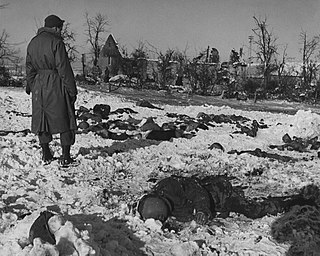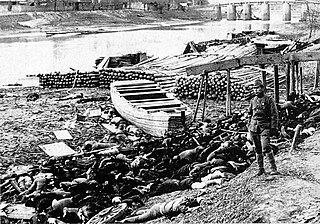In ordinary language, a crime is an unlawful act punishable by a state or other authority. The term crime does not, in modern criminal law, have any simple and universally accepted definition, though statutory definitions have been provided for certain purposes. The most popular view is that crime is a category created by law; in other words, something is a crime if declared as such by the relevant and applicable law. One proposed definition is that a crime or offence is an act harmful not only to some individual but also to a community, society, or the state. Such acts are forbidden and punishable by law.

Genocide is the intentional destruction of a people — usually defined as an ethnic, national, racial, or religious group — in whole or in part. Raphael Lemkin coined the term in 1944, combining the Greek word γένος with the Latin suffix -caedo.

The International Criminal Court is an intergovernmental organization and international tribunal seated in The Hague, Netherlands. It is the first and only permanent international court with jurisdiction to prosecute individuals for the international crimes of genocide, crimes against humanity, war crimes and the crime of aggression. It is distinct from the International Court of Justice, an organ of the United Nations that hears disputes between states.
An urban legend or contemporary legend is a genre of folklore comprising stories circulated as true, especially as having happened to a "friend of a friend" or family member, often with horrifying or humorous elements. These legends can be entertaining but often concern mysterious peril or troubling events, such as disappearances and strange objects. They may also be confirmation of moral standards, or reflect prejudices, or be a way to make sense of societal anxieties.

A war crime is a violation of the laws of war that gives rise to individual criminal responsibility for actions by the combatants, such as intentionally killing civilians or intentionally killing prisoners of war, torture, taking hostages, unnecessarily destroying civilian property, deception by perfidy, wartime sexual violence, pillaging, the conscription of children in the military, committing genocide or ethnic cleansing, the granting of no quarter despite surrender, and flouting the legal distinctions of proportionality and military necessity.

Crimes against humanity are certain acts that are purposefully committed by a state, or on behalf of a state, as part of a widespread or systematic policy, typically directed against civilians, in times of war or peace. The violent nature of such acts are considered a severe breaching of human rights, hence the name. They differ from war crimes because they are not isolated acts committed by individual soldiers but are acts committed in furtherance of a state or organizational policy. The first prosecution for crimes against humanity took place at the Nuremberg trials. Initially being considered for legal use, widely in international law, following the Holocaust a global standard of human rights was articulated in the Universal Declaration of Human Rights (1948). Political groups or states that violate or incite violation of human rights norms, as found in the Declaration, are an expression of the political pathologies associated with crimes against humanity.
Atrocity or Atrocities or Atrocious may refer to:

Homicide occurs when a person kills another person. A homicide requires only a volitional act or omission that causes the death of another, and thus a homicide may result from accidental, reckless, or negligent acts even if there is no intent to cause harm. Homicides can be divided into many overlapping legal categories, including murder, manslaughter, justifiable homicide, assassination, killing in war, euthanasia, and capital punishment, depending on the circumstances of the death. These different types of homicides are often treated very differently in human societies; some are considered crimes, while others are permitted or even ordered by the legal system.

The law of war is the component of international law that regulates the conditions for initiating war and the conduct of warring parties. Laws of war define sovereignty and nationhood, states and territories, occupation, and other critical terms of law.

Nathan Freudenthal Leopold Jr. and Richard Albert Loeb, usually referred to collectively as Leopold and Loeb, were two wealthy students at the University of Chicago who kidnapped and murdered 14-year-old Bobby Franks in Chicago, Illinois in May 1924. They committed the murder – characterized at the time as "the crime of the century" – as a demonstration of their ostensible intellectual superiority, which they believed enabled and entitled them to carry out a "perfect crime" without consequences.
Black Hand or The Black Hand may refer to:
Gang war(s) may refer to:

War crimes were committed by the Empire of Japan in many Asian-Pacific countries during the period of Japanese imperialism, primarily during the Second Sino-Japanese and Pacific Wars. These incidents have been described as an "Asian Holocaust". Some war crimes were committed by Japanese military personnel during the late 19th century, but most of them were committed during the first part of the Shōwa era, the name which was given to the reign of Emperor Hirohito.
Winter Soldier or Winter Soldiers may refer to:

Marocchinate is a term applied to the mass rape and killings committed during World War II after the Battle of Monte Cassino in Italy. These were committed mainly by the Moroccan Goumiers, colonial troops of the French Expeditionary Corps (FEC), commanded by General Alphonse Juin, and mostly targeted civilian women and girls in the rural areas of Southern Lazio, between Naples and Rome. Mass rapes continued across all the campaign including several locations in Tuscany: Siena, ad Abbadia S. Salvatore, Radicofani, Murlo, Strove, Poggibonsi, Elsa, S. Quirico d’Orcia, Colle Val d’Elsa.
Amnesty is defined as "A pardon extended by the government to a group or class of people, usually for a political offense; the act of a sovereign power officially forgiving certain classes of people who are subject to trial but have not yet been convicted." Though the term general pardon has a similar definition, an amnesty constitutes more than a pardon, in so much as it obliterates all legal remembrance of the offense. Amnesty is increasingly used to express the idea of "freedom" and to refer to when prisoners can go free.
Serbian war crimes may refer to:
Crime Patrol may refer to:
A mafia is an ethnic, family or culture-based organized crime enterprise.








